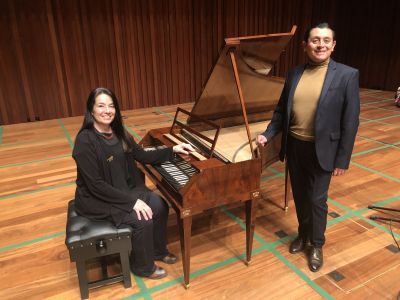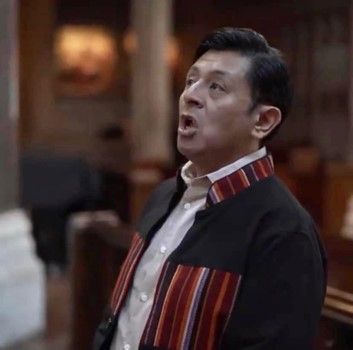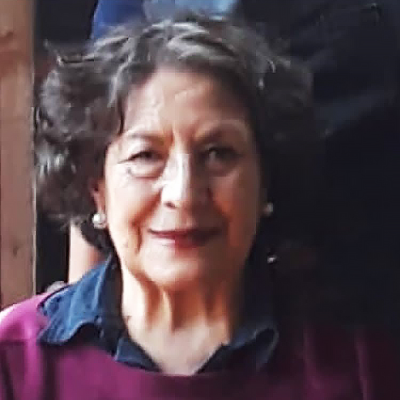
Breadcrumb navigation
The Songs of Pedro Ximenez Abril y Tirado (1784-1856)
Listen to the songs and valsesWhite space
Español→
A performance research project on a neglected Latin American master
A small grant from the AHRC's Open World Research Initiative supplemented by a generous private donation through the Guildhall School Trust made it possible to convene a project centred on the first professional recordings of a selection of songs from the more than 300 composed by Latin America's most prolific 19th century composer, most of whose works were lost for more than a century. This project is a contribution towards broadening the repertoire of art songs beyond the European canon. In the sections below you can not only hear the recordings but also follow the story of this fascinating composer and the significant links he was able to make between the imported European song form and the older indigenous folk traditions which survive to this day.
Introduction to the project
Español→
Introduction to the project
Pedro Ximénez Abril y Tirado was one of Latin America’s most successful and prolific composers of the early 19th century, whose work spanned the critical period of the establishment of independent Latin American states in the period after the end of the Spanish Empire. Known at the time as “El sinfonista de los andes”, he learned his craft during colonial years, but was able to contribute to the body of early postcolonial repertoire. In the 20th Century his work fell from view. It is only now, with the greater interest in postcolonial studies and the rehabilitation of indigenous musics that his work has begun to receive scholarly and artistic attention. His work exemplifies the cosmopolitanism and cultural mobility that was an important strand in the establishment of a distinct Latin American cultural life. At the peak of his career he occupied a prestigious position as director of music at Sucre Cathedral, the most important cultural and religious city of the newly created state of Bolivia, under the direct patronage of President Andrés de Santa Cruz.
These secular songs exemplify this cosmopolitanism in both words and music. The poems are drawn eclectically from European and Latin American sources. In his post-colonial period he set to music South American poets like Esteban Echeverría and Manuel Martínez, from Argentina and Mexico respectively, who took their inspiration from the culture in which they were living, working in the neoclassical and romantic poetic style. The music also shows stylistic variety. Whilst the predominant style draws on European models (with similarities to Mozart, Haydn, and Bellini), there are also strong indigenous influences in some, particularly in a set of “Jaravi”, songs drawing on the ancient traditional genre of Andean music and indigenous lyric poetry.
In all of these respects Pedro Ximénez exemplifies the cultural syncretism that has been a prevailing feature of Latin American music at many historical junctures. At a time when the impetus to de-privilege the European classical canon grows ever stronger, Ximénez is a neglected composer of the highest quality whose works deserve wide contemporary exposure and integration into the corpus of established art songs.
The project was conceived and initiated by Rafael Montero, freelance singer and project leader, an Argentinian of native American Bolivian descent. In 2019 Montero established a partnership with Juan Conrado Quinqivi Morón, who has taken the primary initiative to start transcribing and editing the 300 or so songs whose original manuscripts (hitherto in private ownership) have recently been acquired by the National Archive of Bolivia. By 2019 Morón had transcribed some 40 of the songs, and it is from these 40 that a selection was made for the project. Morón has designated Montero to be the first to record these songs, and Montero invited Carole Cerasi, Professor of Fortepiano at Guildhall School to intepret the keyboard parts as well as perform two of Ximénez' solo valses. The project falls under a developing strand of the artistic and scholarly work of Guildhall School, focusing on Hispanic music, inaugurated and led by Professor Sir Barry Ife.
The illustrations used in various places on this page are from paintings of Bolivians from the period in which these songs would be circulating. They are by Melchor María Mercado from his Album de paisajes, tipos humanos y costumbres de Bolivia (1841-1869), and reproduced here by kind permission of the National Archives and Library of Bolivia, who also kindly supplied the original scores that are reproduced here. The project represents the joint efforts of Bolivian, Argentinian, UK and US-based scholars and performers, as a contribution to greater intercultural understanding and appreciation particularly between former colonised and colonising regions of the world. To assist the effective exchange of information key elements of the project are presented in both English and Spanish.
A mi dulce dueño: songs and valses by Pedro Ximenez Abril y Tirado
Español→
Recordings made by Rafael Montero (tenor) and Carole Cerasi (fortepiano) in Milton Court Concert Hall on 8th and 9th December 2020. McNulty fortepiano by kind permission of Mitsuko Uchida. Sound engineer Jonathan Eato (DeepBit Audio) supported by the Guilldhall School AV Team: Mark Rainbow, Izziiee Jewell, Mimi Hemchaoui, Dean Simister. Fortepiano tuning by Ed Pickering.
Scores and lyrics
Español→
Original handwritten manuscripts are courtesy of the Archivo y Biblioteca Nacionales de Bolivia. Sample modern performing editions are by Juan Conrado Quinqivi Morón, from "Canciones de Pedro Ximénez Abrill Tirado. Transcription y edición de partituras Juan Conrado Quinquivi Morón. Archivo y Biblioteca Nacionales de Bolivia. Fundación Cultural del Banco Central de Bolivia. 2021". The full publication may be obtained from contacto@abnb.org.bo. English translations of the original Spanish lyrics are by Barry Ife.
Rafael and Carole

McNulty Fortepiano by kind permission of Mitsuko Uchida. [Photo: John Sloboda, December 2020]
Commentaries and documentation
Español→
Two specially commissioned commentaries by Drew Edward Davies (Northwestern University, USA) and Beatriz Rossells (Instituto de Estudios Bolivianos at Universidad de San Andrés, La Paz, Bolivia) set these songs in their wider historical and musicological context. These are supplemented by a recorded conversation between the performers and Professor John Sloboda (Guildhall School of Music & Drama) and a report of an online seminar held in September 2020 to launch the project. In this section is also found bibliographic and technical specifications and the biographies of the performers.
 |
Rafael Montero Tenor and project leader Founder of the Hispanic early music ensemble El Parnaso Hyspano, Rafael is a solo tenor and ensemble singer, singing teacher, and coach. Rafael’s heritage is native American and Spanish, and he has spoken Quechua since he was a child. He specialises in renaissance Spanish and South American Baroque music and also in Romantic and contemporary chamber music from Hispanic South America and Spain. He studied singing at the Conservatorio Nacional de Cordoba, Argentina, and then early and chamber music at the Conservatoire de Musique de Neuchatel, Switzerland. He has researched and devised the programmes that El Parnaso Hyspano presents, drawing on his heritage and wide contacts in the Latin American world. In July 2022 he sang the title role in the UK premiére of Domenico Zipoli’s San Ignacio de Loyola, a baroque opera written for indigenous people from whom he is descended. In October 2022 at Sands Films Music Room, Rotherhithe, he devised and premiered El Indiano, a dramatised imagined encounter between Latin American and English musical cultures of the 17th Century, including music by Juan Aranés, Robert and John Dowland, Francisco Guerrero, Juan Hidalgo, and Henry Purcell. He is also collaborating with Border Crossings, an intercultural arts organisation founded and directed by Michael Walling, specialising in the presentation of indigenous art forms.
|
|
Carole Cerasi Fortepiano Carole Cerasi has established herself at the very front rank of early keyboard players and recording artists in her field. Known for her expressive and virtuosic interpretations, fluidity of phrasing and refined touch, she has given recitals throughout Europe as well as in Japan, Singapore, Hong Kong, Colombia, Israel, Canada and the States. Her CDs have won many major awards (Elisabeth Jacquet de La Guerre, Gramophone Awards; C.P.E. Bach and Thomas Tomkins, Diapason d'Or de l’Année; J.S. Bach and the Möller Manuscript, Diapason d’Or de l'Année and runner-up Gramophone Awards; Scarlatti, runner-up Gramophone Awards). In 2018 Metronome Recordings released her 10 CD set of François Couperin’s complete harpsichord works, which received a Diapason d’Or. A highly respected teacher, besides her work as Professor of Harpsichord and Fortepiano at the Royal Academy of Music, the Guildhall School of Music & Drama and the Yehudi Menuhin School, Carole is a much sought-after pedagogue by talented students of the younger generation. She is also in demand as a member of international jury panels. She has recently been named harpsichord professor at the Royal Conservatoire The Hague. Carole comes from a Sephardic family based in Istanbul, and spent her childhood in Stockholm, Geneva and Jerusalem; her mother tongue is French.
|
 |
 |
Juan Conrado Quinquivi Morón Editor Juan Quinquivi is a musician specialising in violin. As a professional, he conducts musical research making critical transcriptions of colonial and republican music from Bolivia, for his modern performance with his casts. Since 2012, he has been making premieres of musical works belonging to the Musical Archive of the Sucre Metropolitan Cathedral. He premiered works by Antonio Durán de la Mota, Roque Jacinto de Chavarría, Juan de Araujo and Doménico Zípoli in the city of Sucre and at the International Festival of Renaissance and American Baroque Music "Misiones de Chiquitos". He has been in charge of the "San Francisco Xavier" University Violin Workshop since 2009 and director of the "San Francisco Xavier" Polyphonic Choir since 2015, both housed at the Universidad Mayor, Real and Pontificia de San Francisco Xavier de Chuquisaca. |
|
Jonathan Eato Sound recordist Jonathan Eato is a sound recordist and mixing / mastering engineer with interests in a wide range of contemporary musics, jazz, improvisation, South African popular music, and interdisciplinary performance. Recent clients include Blue Note Records, Universal Music, Nduduzo Makhathini, Sisonke Xonti, LAN Trio, Hannah Bruce and Company, Sibusiso Mashiloane, The Barbican, Hoxton Hall, and Nocturnal Pictures. He is also a Senior Lecturer in Music at the University of York, and with research interests in music and postcoloniality and South African jazz music. |
 |
 |
Beatriz Rossells Montalvo Expert commentator Born in Sucre, Bolivia. Anthropologist and Historian. She pursued studies in law at the Universidad Mayor de San Francisco Xavier (Sucre), history and anthropology at the University of Paris VIII (Vincennes), in Cambridge (England), and at the School for Advanced Studies in Social Sciences (Paris). She earned a Ph.D. in History from the Central University of Venezuela. She currently works at the Universidad Mayor de San Andrés, serving as the director of the Institute of Bolivian Studies in the Faculty of Humanities and Education Sciences. Among her publications are: "The Power of Music and Dance in Bolivia: Social History in the 19th and 20th Centuries" (2018); "The Carnival of La Paz and Jisk'anata" (co-authored 2009). Various articles on 19th-century composers in Bolivia, including Pedro Ximenes de Abril y Tirado and Simeón Roncal. She also served as the biographer of renowned composers and singers such as Lola Sierra, Gladys Moreno, and Matilde Casazola. In the field of history, she has published: "Woman: An Illusion. Ideologies and Images of Women in 19th Century Bolivia.", "Women in the History of Bolivia: Images and Realities of the 19th Century." |
|
Drew Edward Davies Expert commentator Drew Edward Davies is a music historian specializing in New Spain. He is Chair of the Department of Music Studies and Associate Professor of Musicology at Northwestern University’s Bienen School of Music as well as Academic Coordinator of the Seminar on the Music of New Spain and Independent Mexico in Mexico City. Among his publications are Manuel de Sumaya: Villancicos from Mexico City (A-R Editions, 2019), Catálogo de la Colección de Música del Archivo Histórico de la Arquidiócesis de Durango (UNAM, 2013), Santiago Billoni: Complete Works (A-R Editions, 2011), chapters in collections such as Music and Urban Society in Colonial Latin America (Cambridge, 2011) and The Routledge Companion to the Hispanic Enlightenment (2019), and articles in journals such as Early Music. With Lucero Enríquez and Analía Cherñavsky, he has published the first four of eight projected volumes of Catálogo de obras de música del Archivo del Cabildo Catedral Metropolitano de México (UNAM, 2014-19), and with Javier Marín-López he has initiated the series Ignacio Jerusalem (1707-1769): Obras Selectas - Selected Works (Dairea Ediciones, 2019) which has now reached six volumes. His collaboration with Chicago Arts Orchestra produced two albums of music by Billoni and Jerusalem released on Navona Records. Currently he serves as President of the Society for Eighteenth-Century Music (SECM).
|
 |
 |
Barry Ife Translator Professor Sir Barry Ife CBE was Principal of the Guildhall School from September 2004 to January 2017, and is now Research Professor at the School. As a professional academic, Barry Ife specialises in the cultural history of Spain and Spanish America from the fifteenth to the eighteenth centuries. After holding lectureships at Nottingham University and Birkbeck College, he was appointed to the Cervantes Chair of Spanish at King’s College London in 1988. Professor Ife was appointed CBE in the 2000 birthday honours for services to Hispanic studies. In 2017, he was awarded a Knighthood for services to performing arts education. He currently directs an international research project “Texting Scarlatti: Composition, Reception, Performance", which is funded by the Leverhulme Trust. |
|
John Sloboda
Project co-ordinator Professor John Sloboda OBE FBA is Emeritus Professor at the Guildhall School, where he was founder of its Institute for Social Impact Research in the Performing Arts. He is a singer, pianist, conductor, and researcher. He is a founder member of the Hispanic early music ensemble El Parnaso Hyspano. He has sung with many groups including the Chapel Choir of the Queen’s College Oxford, the Chorus of the Academy of St Martin’s in the Field, and the City of Birmingham Symphony Chorus. At Keele University he was founder conductor of the Keele Bach Choir and conducted performances of many major works including Monteverdi’s Vespers and Bach’s Mass in B Minor. He is also a music psychologist and is author of many books, including “Exploring the Musical Mind”. In 2018 he was awarded the OBE for services to Psychology and Music.
|
 |
Video
Slice - to let Logos switch to Black background






